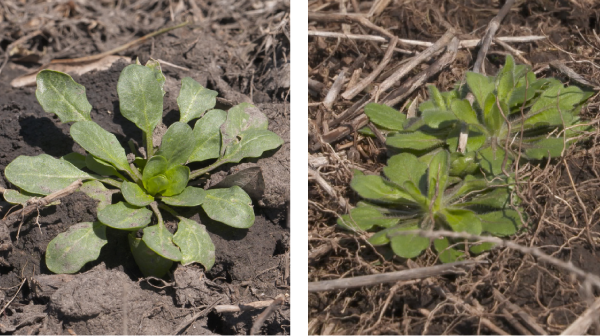SPRAYING HERBICIDE BEFORE FREEZE-UP
By Brian Hefty
Yes, it may already be too late to spray in your area, but if the ground isn’t frozen and there is little to no snow on your fields, you could either spray now OR very early in the spring. While you may not be used to spraying in October/November or in February/March, I’ll give you a few reasons why these spraying timings can really help your yields and profits, as well as talk about the products of choice and when and where to spray.
First, let’s talk about the reasons you should consider spraying now.
- 1. Herbicides are always less expensive in the fall. Buying and spraying now will save you money vs. your spring purchases.
- 2. By getting a residual herbicide out right now (or very early in the spring), you will get great control on early-emerging spring weeds. If kochia, waterhemp, Palmer pigweed, ragweed, and lambsquarters are an issue for you, why not get the jump on these weeds and stop them before they ever get out of the ground? Remember that if you have heavy weed pressure, even half-inch tall weeds will hurt your yield.

With the appropriate products, late fall or early spring applications can be extremely beneficial for control of winter annual weeds like pennycress (left) and marestail (right).
- 3. Winter annuals are exploding across the country. The best time to control winter annual weeds is right now. Yes, you’ve already had a frost in your area, but if there is any green left on those winter annuals, you will burn them down. Plus, with residual herbicides, the root activity can still control them this fall if your ground is not yet frozen. If you let winter annuals go unimpeded, they will be huge come spring and very difficult to control. Marestail, henbit, pennycress, and tansy mustard are just a few of the winter annuals you may see on your farm.
- 4. In the spring, planting timing is absolutely critical. If you don’t want to stop your planter to spray herbicides, spray now or very early in the spring. By the way, I’ve mentioned early spring several times, and I should explain exactly what I mean by that. If the ground is frozen in the mornings, thawing in the afternoons, that’s when you should spray if you want to be super-early, yet safe. You shouldn’t spray ground that is frozen solid, but if it is in the process of fully thawing out, that’s a perfect timing, just as the last of the snow is melting.
In terms of herbicide selection, here are four product categories I want you to consider, and two you should avoid…
YES:
Dicamba/2,4-D.
I love very high rates of dicamba and 2,4-D to burndown broadleaf weeds and leave a few week’s worth of residual. By high, I mean the highest labeled rate. For example, in the fall, this is 1 quart of Banvel. If you are planting corn or Xtend crops in the spring, Banvel in the fall is great. For anything else, go 2,4-D, as it doesn’t have quite as much residual.
Yellow.
If you fall or very early spring apply Trifluralin, Sonalan, or Prowl, you will get great residual and excellent control on both grass and small-seeded broadleaves.
Group 15.
Harness, Surpass, Outlook, Dual, and Zidua are all great choices if you are going to plant corn.
Valor or Authority.
The PPOs can last a long time in the soil and stop most broadleaf weeds. If you are planting a crop where Valor or Authority is labeled, use a high rate in the fall or very early spring, and you should get excellent weed control.
NO:
Roundup.
Roundup doesn’t work well in the fall after your first frost, and in the very early spring, the cold weather usually decreases your odds of having great control. Since Roundup also has no soil activity, I do not recommend it in these situations.
Metribuzin.
While we love metribuzin around planting-time in soybeans and other crops where it is labeled, it doesn’t have a long residual, so spraying it months before you need it is not usually a good way to go.
My final comment is this. Don’t spray anywhere you won’t plant very early in the spring. If your ground may flood or for any other reason you won’t be able to plant in a field very timely, don’t spray it in the fall or early spring with a residual product you are counting on to give you in-season control. No herbicide lasts forever, and if you spend the money, you want great value. Getting crop canopy as quickly as possible is important, so if you want to (or have to) plant late, our advice is to spray your herbicide late, as well.
On our farm, we do a lot of fall spraying each year, and it works out very well. We also have a history of very early spring applications, and that has also been an excellent way to spread our workload and get great weed control. I strongly encourage you to consider these herbicide timings.
